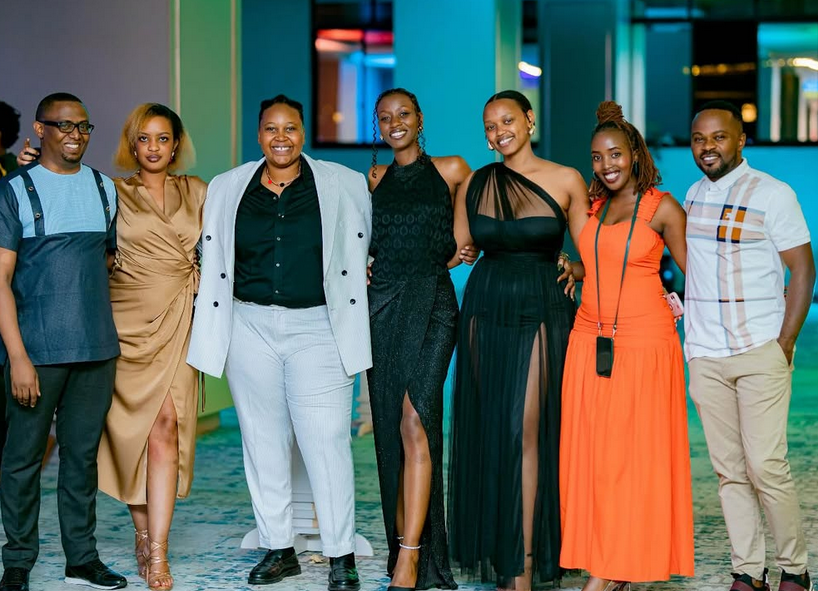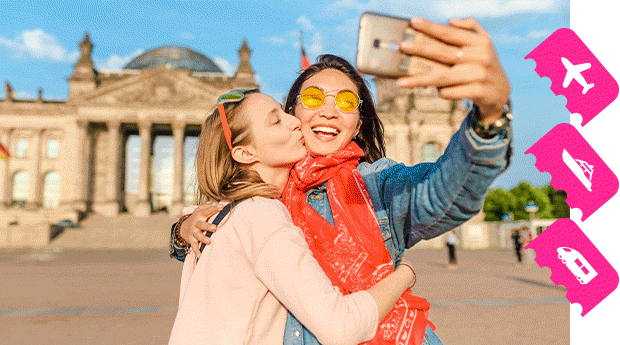Despite Rwanda’s gorgeous green hills, clean streets, kind people, interesting (though devastating) history and proximity to mountain gorillas, the country is often overlooked as a travel destination.
Although it’s a fairly conservative, religious country in terms of LGBTQ+ freedoms and cultural taboos, it’s very friendly compared to neighbouring countries, most of which have anti-gay laws. There are few laws or policies protecting LGBTQ+ people from discrimination, and same-gender marriage, adoption and gender transition are not permitted. But same-sex sexual activity has never been illegal in Rwanda, and the age of consent is 18, the same as for straight sex.
When I travelled to Rwanda a few months ago, I knew I’d be able to let my gay guard down a little. But I never imagined that I would end up partying with local lesbians at a rooftop bar in Kigali, the capital and largest city, with a population of about 1.75 million.
I connected with Astherie, a queer woman based in Kigali, through a Queer Women’s Travel Group on Facebook. She was extremely welcoming and invited me to a fashion show showcasing some of the hottest designers and models in the country. As most LGBTQ+ travellers know, queerness can forge quick connections, and I easily jumped into conversation with the lesbian couples I met at the bar. Fun chit-chat over drinks eventually led to more serious conversation, and I learned that two of my new friends worked for LBQGNC rights organizations in Kigali. (They intentionally used this acronym since their organizations don’t cater to gay men; the “GNC” stands for gender nonconforming.)
I naively hadn’t given much thought to organizations like this. When I visit countries as a queer traveller, I somewhat selfishly spend a lot of time thinking about my own rights and safety abroad. I spend less time thinking about what local queers are up to, how they are surviving and thriving and connecting in places where their government has deemed their existence illegal, or where their families consider their love immoral. But of course, anywhere there’s oppression, there are minority groups resisting and fighting for their rights (and for their joy).
After meeting at the fashion show, I caught up with Astherie of Ndabaga’s Sisters and D (her name has been changed to protect her safety) of Feminist Action Development Ambition (FADA) Rwanda to learn more about their organizations and the joys and challenges of queer life in Rwanda.
Tell me about the organization you work for.
Astherie: I am the founder of an LBQGNC organization called Ndabaga’s Sisters, named after the Rwandan hero Ndabaga who defied traditional gender roles, dedicated to empowering and uplifting marginalized voices within the community. Our work encompasses several key areas. We focus on digital literacy by providing training and resources, enabling community members to access information, job opportunities and connecting with broader networks.
We also engage in research and documentation to highlight the experiences and challenges faced by LBQGNC individuals. We strive to create opportunities through workshops, skills training, and initiatives that promote entrepreneurship, aiming to alleviate poverty and enhance financial independence within the community. We provide resources and support focused on mental well-being, including counselling and group therapies, fostering a safe environment for sharing experiences and promoting overall wellness.
Additionally, we host a podcast called No Gender, where we discuss diversity, inclusion and experiences that travel beyond the binary. Through engaging conversations with guests from various backgrounds, we seek to foster a deeper understanding of gender and sexuality.
D: I work in Feminist Action Development Ambition, which is a feminist non-governmental organization formed in 2015, with a mission to promote and protect women’s rights, particularly for the most marginalized and disadvantaged groups. FADA’s work is rooted in addressing systemic inequalities and fostering inclusive development for vulnerable communities, such as sex workers, LBTQ+ individuals and their children.
What is your experience like being a queer person in Rwanda? Do you feel that you can be “out”?
Astherie: Being a queer person in a conservative religious country is hard and complex and challenging, but there’s significant grey area regarding laws and policies, which can create a sense of uncertainty as the government doesn’t support us, but nor do they condemn us. However, I feel fortunate to be part of a community that has established safe queer joy spaces, initiatives and organizations, both in rural and urban areas, that cater to the needs of the LGBTIQ/sex workers with intersectionalities of PWUD (People Who Use Drugs) and disability rights. While being “out” can be risky, there are organizations that support the community in understanding themselves and informing people that they really don’t have to come “out” if they don’t want to, while further offering SOGIE knowledge through different methodologies.
What are some positive things going on for the LGBTQ community in Rwanda?
Astherie: We’ve been able to create safe spaces and organize events that promote queer joy, group therapies and collective remembering of the Rwandan Queer movement, to create short films of queer folks’ lived realities in Rwanda. Additionally, our ability to engage in research and documentation has enhanced visibility, and participation in international forums has opened doors for advocacy and change. We have also been exploring ways of eradicating poverty by creating economic justice initiatives, such as driving skills, graphic design and income-generating activities that support the community.
D: There is no law criminalizing the LGBTQ+ community, but it doesn’t remove the fact that there is social stigma and discrimination on the ground. There are not a lot of queer events that are open to the public, since the organizers would get backlash from society. But we have queer organizations like FADA. We get to meet as queer folks and discuss our challenges as well as have a good time.
Can you expand on the challenges that the LGBTQ+ community faces in Rwanda?
Astherie: Underfunding and a lack of supportive laws and policies. Safety and security, particularly for trans individuals, are significant concerns. Additionally, access to health services tailored to LBQGNC folks and the pursuit of economic justice remain pressing issues.
D: Despite Rwanda’s significant progress in gender equality and non-discrimination policies, queer persons still face discrimination, violence and restricted access to essential services like health services. Being queer and out is difficult since you’re going to face discrimination and social stigma, especially for trans folks. Being queer here requires walking on eggshells—you have to keep it to yourself. When trying to register LGBTQ+ organizations, you risk not being successful if you say it is a queer organization. You have to mask it under broader categories like vulnerable women or other affiliated communities.
How can queer travellers to Rwanda connect with local members of the LGBTQ+ community or find out about events? How can Pink Ticket Travel readers support your organization?
Astherie: Just like you did, by reaching out to Ndabaga’s Sisters Organization via Instagram—our website and email are other ways of connecting with us. Your experience here was beautiful, and us experiencing you in Rwanda was magical as well. We can always provide insight regarding which spaces are safe and inclusive while also helping you to connect with other like-minded folks.
Readers can support our organization by visiting our website and reaching out through social media for donations. Additionally, connecting us with funders who can support our programs and initiatives would be invaluable in furthering our mission.
D: You can contact us through our social media: Facebook or Instagram. There are different ways you can support our organization. There is sharing knowledge. There is also sharing ways to get funds since most queer organizations still survive on grants. Sustainability is important. We need to learn more about which income-generating activities we can start as an organization or a collective.
This interview has been edited for length and clarity.


